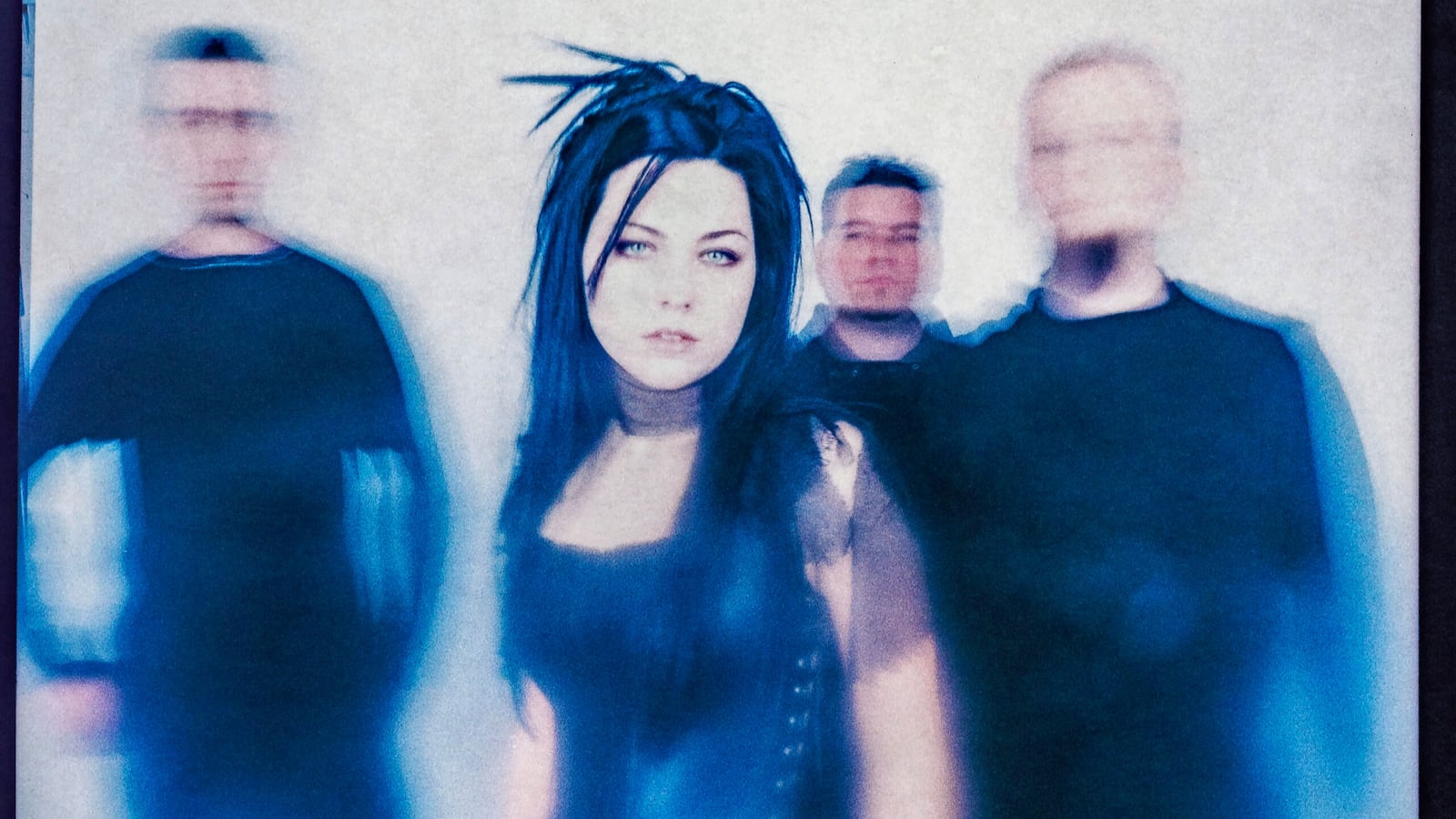Last year, Evanescence’s thrashing 2003 breakout hit “Bring Me to Life” hit No. 1 on iTunes, ahead of contemporary artists Blackpink and Nicki Minaj. It was a curious phenomenon; though perhaps not quite as shocking in a time when TikTok regularly spins oldies from Fleetwood Mac and Jack Johnson into surprise viral hits. Still, it spoke to Evanescence’s resilience as a rock stronghold. It still feels good to scream along with them, and “Bring Me to Life” hits just as hard today as the first time you watched Amy Lee slip from a high-rise into a terrifying free fall through a goth metropolis. Which is perhaps why the band has now decided to commemorate the 20th anniversary of their debut album, Fallen, in spectacularly nostalgic fashion.
On Friday, Evanescence will release an expanded edition of Fallen that includes remastered versions of hits like “Bring Me to Life,” “Going Under,” “Everybody’s Fool,” and “My Immortal,” plus B-sides, previously unreleased demos, and live recordings.
“With all that we have been through and all the incredible love we’ve had from our fans over the years, we couldn’t let 20 years go by without celebrating the milestone in some way. It’s really just a way to say thank you to the fans,” Lee tells The Daily Beast over Zoom from her home in Nashville, where she’s now “in normal mom mode” after returning from the band’s latest tour, where they played some of the biggest shows of their two-decade career.
For Lee, 41, it was a trippy experience to dig through the archives and stumble upon voice recordings and demos of her teen self working out the lyrics and melodies to those Fallen songs. “It’s like reading an old diary,” she says of some of those admittedly “pretty cringey” demos. And though she confesses to once feeling pigeonholed by the music that catapulted the band into superstars, she’s made her peace with it over time.
“I went through that phase. I’m over it. I’m ready to accept my whole self,” she says. “I think it would be way more like ‘agh!’ if it was the only thing that existed of us in the world. It would be cringier if that was the only thing we ever did and then I fell away and didn’t have any representation of my adult self.”
It doesn’t hurt that she still loves the music, and the songs—as we learned last year with that surprise iTunes moment—still hold up today. Lee points to Fallen cuts like “Imaginary,” which has been on every setlist for every show the band has done over the years, and the album’s second single, the rageful rocker “Going Under.”
“I always really loved ‘Going Under.’ It was a win for me that it was our second single and that it succeeded,” she says. “I was afraid—you’re always afraid when it’s your first song—like, are we gonna have more? Are they gonna keep listening? Is this our one shot and it’s over and they’ve only heard ‘Bring Me to Life?’” And then we got past that moment and it was like, sweet, OK.”
The success of “Going Under” was especially important because it showed the world who Evanescence really was: a woman-fronted, single-vocalist band. Lee has previously shared the story of “Bring Me to Life” being chosen as their first single, revealing a few years ago that their record label insisted on adding a male vocalist to the song because they were worried about the marketability of a female-fronted rock band. That’s how Christian rocker Paul McCoy of 12 Stones ended up contributing a rap verse and singing over the chorus of the song. At the same time, there’s a 2003 MTV News interview with Lee where she says the decision to add McCoy to the song was because Fox, the studio behind the 2003 superhero movie Daredevil—which would feature “Bring Me to Life” and “My Immortal” on its soundtrack—asked for it.
“I think those are both possibly true,” Lee says of the dual narratives. “I say possibly because, you know, you’re getting that information secondhand. I didn’t speak to Fox. I was told things. So was somebody telling me that that’s what they wanted so that I would have to do what they wanted? I’m actually not sure.”
“It definitely was something the label thought of first and they wanted,” she continues. “In their mind, it became this thing that took over too much. Their initial mandate for us was that we were going to need to put somebody in the band full-time and put him on like eight out of 11 tracks on the album, to be the female Linkin Park or something. Because that’s something that was like something else, and then [the label] could pitch it that way. And I was just like, absolutely not. You’re not going to change our band. I’m not doing that. And they were like, OK, then go home. It’s over.”
That’s exactly what happened, and Lee—who had moved to Los Angeles to start making the band’s first album after they’d signed their record deal—suddenly found herself living back home with her parents in Little Rock, Arkansas. Then, after three weeks that “felt like forever,” the label called her and said they’d changed their mind—the band didn’t have to alter its lineup, but they did have to add a male singer to “Bring Me to Life” because the song had already been pitched to Fox as a male-female duet. (It’s worth noting that the new anniversary edition of Fallen includes the rap-free, McCoy-free demo version of “Bring Me to Life,” which still rips.)
“We were like, OK, that’s the compromise, we’ll do it on one song,” Lee recalls. “They pitched it the way they wanted it to be. And then it was like, you’re stuck doing it now! Yeah, that was a big fight, but I still feel like we were victorious in that fight. I wouldn’t have felt like we were victorious in the end if people heard the one song and hated it because it was cliché and then they never listened or ever realized that we weren’t a two-vocalist thing. We survived the moment.”
“I wouldn’t be here today if we had said yes to that,” she adds of the label’s initial mandate to add a male singer to the band. “It wouldn’t have lasted. It would have made it something that isn’t around anymore. And I remember that was my argument—I was like, why would we do that? Like, you want to put a time stamp on this? That’s a fad. We want to be more than that.”
It’s easy to forget, but when Lee was having these big creative tussles with music execs, she was barely into her twenties—making it all the more impressive that she advocated so strongly for her band, especially in a male-dominated industry.
“When you have to stand up for yourself, you don’t want to. But you do,” she says now. “It was hard for me when I was younger—it’s not as hard anymore—to not get emotional, to not have your eyes start welling up with tears. Things would just make me so angry that I’d be like, ‘Do not have emotion, just say what you’re going to do and what you want, and that’s it. Don’t let them see you get upset.’ And it’s hard sometimes, especially as an artist, when you care about something so much. It’s like, you [the label] have other bands. This is my life. This is my identity. You can’t take it, or I’d rather not do it at all. And to have to put your money where your mouth is and literally go home on that sentiment, and they’re like, ‘OK, go home’... I just didn’t want to look like a child. And I was one! It’s so much harder to fight than to just go ‘ugh, maybe we’ll just start over and call it something else.’ It would have been so much easier to quit so many times.”

Instead, she and her band stood up for themselves, and it clearly paid off. On the back of Fallen, Evanescence became one of the year’s biggest commercial success stories of 2003, selling 17 million copies, going platinum seven times over, and becoming instant peers to the likes of Beyoncé and Britney Spears, whose music videos appeared right alongside the band’s on MTV.
“It was such an interesting time,” Lee says now. “Because there was a platform like MTV or VH1, there was a place [in] the mainstream world for all of those genres to exist on the same show. You’re talking about TRL—one show would have Korn and Backstreet Boys on it. How wild is that?! There was something really cool about that time.”
The mainstream success also brought Evanescence to the 2004 Grammys, where they were up for five awards, including Album of the Year for Fallen (which they lost to Outkast’s Speakerboxxx/The Love Below) as well as Best New Artist, which they won—much to the chagrin of fellow nominee 50 Cent, who responded to the loss by walking onstage during their acceptance speech.
“50 Cent hates my guts,” Lee says, laughing, when recalling that night. “It’s just one of those things… I mean, truthfully, we thought he was going to win too. It was such a wild night. People are like, ‘What was it like to win a Grammy?’ and I’m like, ‘Stressful!’ I mean, it’s wonderful now, to have them, but it was surreal… I just remember thinking, ‘I don’t even think anybody in this room knows who we are.’”
Lee points out that 50 Cent didn’t actually say anything when he hopped onstage, and instead just walked around a bit while she looked on, unfazed, at the microphone and quipped, “Oh what did I do?… Thanks, 50.”
“You know when you’re just in shock? He didn’t do anything, he didn’t grab the mic, it wasn’t that bad. He just sort of like, made an appearance. It was like Zoolander when he thought he won,” Lee says, adding that the rapper never personally said anything to her after the fact. “No, he never said anything to me, but he likes to talk about me and how he was robbed. I don’t want to start a beef with him. Thank you for saying I looked unfazed, I was so fazed. Everything around me was chaos and I was like, I’m going to stand here and see if this is real later, if I wake up or not.”
It was, indeed, one of those surreal Fallen-era moments that Lee admits is strange to look back on now, considering where the band is today.
“This era recently of talking about Fallen all the time has been really strange,” Lee admits. “It’s like, I kind of remember what it was like back then, but it was so long ago, [and] that’s not the band to me anymore.”

Evanescence—which now comprises Lee, guitarists Tim McCord and Troy McLawhorn, drummer Will Hunt, and bassist Emma Anzai—have spent the past two years touring their fifth album, 2021’s The Bitter Truth. In October, they played the biggest headlining show of their career for 40,000 fans at Allianz Park Stadium in São Paulo, Brazil. They already have some ideas banked for their next studio album, which Lee says she’s excited to work on now that she’s back home—and now that the Fallen nostalgia trip is nearing its natural end.
“I think a lot of times, we focus on that beginning moment because ‘that’s when I first saw you’ and ‘that’s when you were on MTV’ and blah blah blah,” she says. “But there’s a big world out there and it’s a beautiful thing to me to learn that we could have our biggest show ever 20 years later. It’s not something you can expect or plan for; you just go with what you got. I get so much out of [the band] at this point. So much more than I expected I would be able to 20 years later.”







